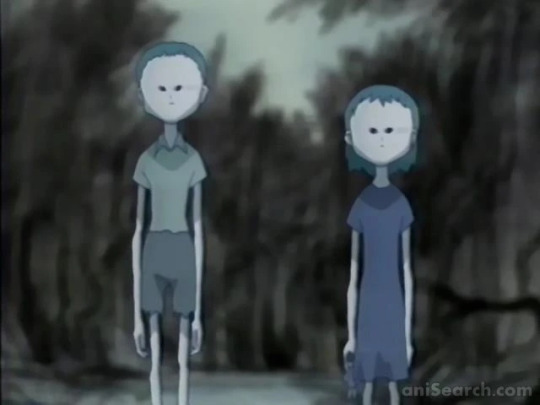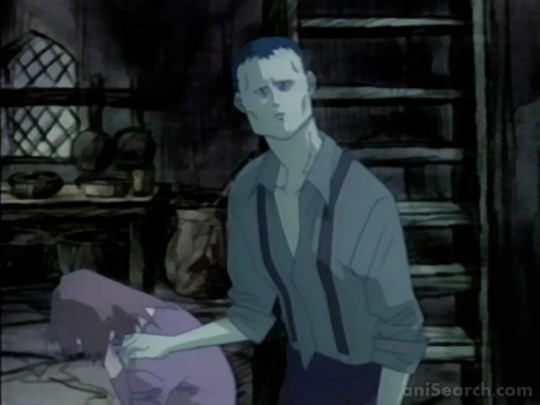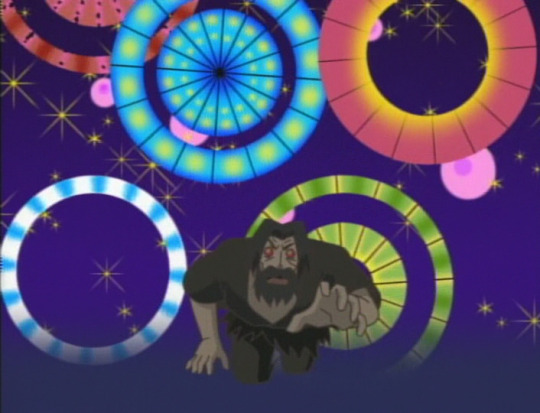#yonimo osoroshii nihon mukashibanashi
Explore tagged Tumblr posts
Text
Fairytales in anime and manga
Yonimo Osoroshii Grimm Douwa / Otona no Douwa / Otona no Dowa series: Yonimo Oroshii Grimm Dowa. (The truly horrible Grimm fairytales) A series of OVA reimagining three European fairytales in different styles - but all as horror stories. (This mini-series is completed by another set of OVA reimagining three Japanese folktales in a similar manner, Yonimo Osoroshii Nihon Mukashibanashi, The truly horrible Japanese folktales. Together they form the Otona no Douwa series - not to be confused with the various hentai mangas of the same name since "Otona no Dowa" means "Fairytales for adults")


















#fairytale anime#horror anime#dark fairytale#fairytale horror#otona no douwa#otona no dowa#yonimo osoroshii grimm douwa#yonimo osoroshii nihon mukashibanashi#japanese folktales#folk horror
7 notes
·
View notes
Text
Post-it notes on Yonimo Osoroshii Grimm Douwa
To sum it up succinctly:
Viscerally. Unpleasant.
An anthology release of three short stories, each a ‘dark’ version of a classic Western fairy tale (there’s a Japanese fairy tale centric anthology as well- Yonimo Osoroshii Nihon Mukashibanashi; I don’t really intend on watching it, all things considered). This ended up being the first anime I’ve watched from raws, since subs don’t exist, and I was kind of surprised at how well I was able to follow it. Knowing the original stories helped, I guess.
The Hansel and Gretel story is uncomfortable and nasty, but at least provides some visual interest with the mother’s character acting and the dark, heavy backgrounds. It’s competently directed, at the very least.
Bluebeard is the standout of the collection, with very strong visual language and interesting characters, but is still ultimately a very sterile and stilted, sort of juvenile feeling effort. I like the aesthetic of it, at least, it feels like an early 2000s music video.
The Cinderella retelling is so violently ugly, poorly animated, and morally repulsive to me that I didn’t bother screenshotting it; I’m sure someone out there, somewhere, must like it, but that person’s not me. There’s no anchoring point for viewer interest, it’s like made just to be nasty and horrible with no real goal beyond that. Bah.
Avoid this one, tbh. The only saving grace is that the episodes are all under 20 minutes.
0 notes
Text
Otona no Douwa: A French review (1)
A long time ago I stumbled upon a French review/article on an anime-dedicated website about an anime reinventing fairytales in a dark, horror tone. And given I never saw anyone else talk about it, I thought I’d quickly recap/translate what this review said about this series.

“Otona no Douwa”, a series of six OAV released by Toei Video during summer of 2002. This series never actually got out of Japan, as in no dub was ever made of it, there is no subtitled version existing (at the time of the writing of the article, which was in 2012 there wasn’t even a fan-sub). And yet, it is actually a little hidden gem of anime horror - a twisted and disturbing reimagination of the fairytales of the brothers Grimm and of Japanese folktales. The reviewer stumbled upon it by complete randomness, when they discovered on Nico Nico Douga the entire series posted - but in a low, VHS quality (the videos were deleted since). However these episodes had a major success on Nico Nico, to the point many parodies of them still exist today.
The OAV were only released on DVD in 2009 - each episode lasts for around 25 minutes and was created by a different team, so it is more of an anthology than a true series. The first three OAV, tituled “Yonimo Osoroshii Grmm Douwa” are based on the brothers Grimm versions of “Hansel and Gretel”, “Bluebeard” and “Cinderella”. The other three OAV, are the “Yonimo Osoroshii Nihon Mukashibanashi”, and they rather adapt Japanese folktales: Saru Kani Kassen (The battle of the monkey and the crab), Kachikachi Yama (Crackling Mountain) and Urashima Taro.
#otona no douwa#japanese media#horror anime#horror fairytale#dark fairytale#fairytale anime#japanese fairytale#japanese folktale#grimm fairytales
6 notes
·
View notes